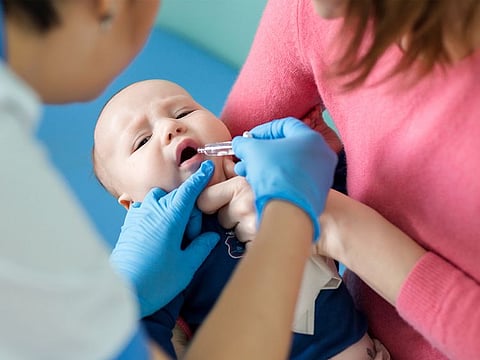Free child vaccinations in the UAE: Keep your children healthy and protected!
From measles to meningitis: Find out the vaccine schedule you should follow

Dubai: The UAE’s National Immunisation Programme has played a key role in ensuring that the country’s public health services are world class. After the programme was introduced as early as 1980, the country has seen a huge drop in the spread of infectious diseases.
The UAE was declared polio-free in 2004 and other diseases like measles, mumps, rubella and pertussis have seen a significant slump. To maintain the high level of public health in the country, the UAE offers free immunisation services for residents.
It is for children to get vaccinated, from birth up to grade 11.
Recent updates to the immunisation programme have introduced a meningitis vacine for students in Grade 11. The polio drops, administered at four months have been discontinued and the fourth Pneumococcal Conjugate Vaccine (PCV) given to chlidren at the age of 15 months in Dubai and 18 months in Abu Dhabi and other emirates has also been discontinued.
Here is a list of the diseases that the immunisation programme covers:
You can get your child vaccinated at any of the health centres by following this step-by-step process.
Dubai
In Dubai, the vaccination is provided by Dubai Health Authority’s public health centres that can be found in most parts of the emirate.
How can I book an appointment?
You can simply visit the nearest public health centre near you to open a file.
The easiest way to find the health centre nearest to you is to call DHA on 800 342 or check out the complete list here.
What documents do I need?
Take the following documents with you:
Important note:
While the vaccinations are provided free of cost, Dubai residents need to get a health card made, which costs Dh120 and is valid for one year. At the registration desk, once you provide all the necessary documents, you will get a health card and a vaccination card. You can then book an appointment for the next vaccine for your child. You can also call the DHA hotline to book an appointment.
Charges:
While it is important to vaccinate your children on time, if the child is having a high fever or a major illness, you can call the call centre to reschedule the appointment at the next available slot.
However, the next slot might not be available immediately and you may need to wait a few weeks.
Important note:
For walk-in services, make sure you arrive an hour before the closing time of any shift. For your scheduled appointments, make sure you arrive 20 minutes before time.
Number to call
Abu Dhabi
Abu Dhabi’s Department of Health (DOH) has a massive vaccination awareness campaign under the theme “Vaccination is essential” emphasising the importance of vaccination to prevent diseases in the community, promotes the use of vaccines to protect people of all ages, increases public awareness of the latest vaccination programs and new vaccines introduced by the Department of Health, and enhances the healthcare professionals’ role to be a vaccine advocate.
What documents do I need?
Take the following documents with you when you visit the health centre:
Charges:
Number to call:
Other emirates
The emirates of Sharjah, Ajman, Ras Al Khaimah, Fujairah and Umm Al Quwain come under the Emirates Health Services (EHS) and you can visit the EHS primary healthcare centre closest to you to get your child/children vaccinated.
Which documents would I need?
To open a vaccination file at a health centre, you will need to take the following documents:
Where should I go?
You can book an appointment through:
- the EHS website - ehs.gov.ae
- the smartphone application 'EHS', which is available for Apple and Android devices
- the call centre - 800 88 77
If the Child's Emirates ID or Passport is not available, visit the primary healthcare center with the required documents. Choose a date at your convenience, and book the appointment.
Visit the primary healthcare centre 20 minutes prior to your appointment for registration.
Charges
There are no charges for opening a file or for getting vaccines which are part of the National Immunisation Programme
Number to call:
Apart from these vaccination, many health centres also provide the following vaccines:
With the UAE's focus on healthcare, it could not be simpler to ensure your child's health and safety. Take advantage of the free public health services to live a healthier life in the country.
The article was first published on December 2, 2019 and has been updated since.
Sign up for the Daily Briefing
Get the latest news and updates straight to your inbox


